
Pompeo Girolamo Batoni was an Italian painter who displayed a solid technical knowledge in his portrait work and in his numerous allegorical and mythological pictures. The high number of foreign visitors travelling throughout Italy and reaching Rome during their "Grand Tour" led the artist to specialize in portraits.
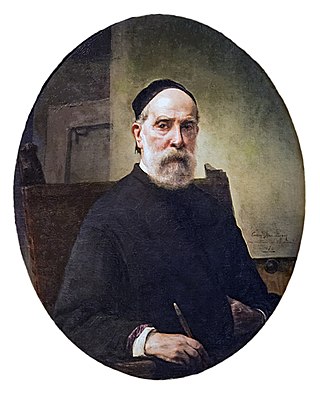
Francesco Hayez was an Italian painter. He is considered one of the leading artists of Romanticism in mid-19th-century Milan, and is renowned for his grand historical paintings, political allegories, and portraits.

The Pinacoteca di Brera is the main public gallery for paintings in Milan, Italy. It contains one of the foremost collections of Italian paintings from the 13th to the 20th century, an outgrowth of the cultural program of the Brera Academy, which shares the site in the Palazzo Brera.

Il bacio is an 1859 painting by the Italian artist Francesco Hayez. It is possibly his best-known work. This painting conveys the main features of Italian Romanticism and has come to represent the spirit of the Risorgimento. It was commissioned by Alfonso Maria Visconti di Saliceto, who donated it to the Pinacoteca di Brera after his death.
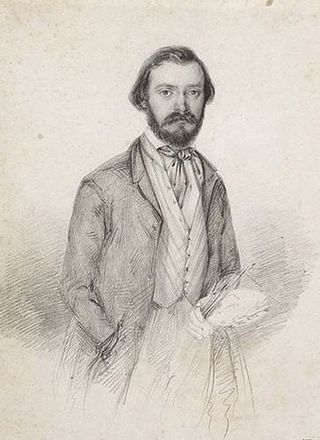
Domenico Induno was an Italian painter, primarily of genre and historical scenes. His younger brother, Gerolamo, also became a well-known artist and they often worked together.

Elena Clara Antonia Carrara Spinelli was an Italian woman of letters and backer of the Risorgimento, usually known by her married name of countess Clara Maffei or Chiarina Maffei.

Silvio Vigliaturo is an Italian artist. When still a child he moved to Chieri (Turin), where presently he lives and works. He is a glassfusion maestro and his technique is appreciated internationally and considered unique in his genre by the most important Italian and foreign critics.

The Basilica of Saint Anthony of Padua al Laterano is a Roman Catholic titular church in Rome on Via Merulana, one block from the Obelisk of St. John Lateran. It was built for the Order of Friars Minor, who needed a new home after they were moved from Santa Maria in Ara Coeli to allow the construction of the Victor Emmanuel II Monument.

The Galleria d'Arte Moderna is a modern art museum in Milan, in Lombardy in northern Italy. It is housed in the Villa Reale, at Via Palestro 16, opposite the Giardini Pubblici Indro Montanelli. The collection consists largely of Italian and European works from the eighteenth to the twentieth centuries.

Cherubino Cornienti was an Italian painter, active in a Romantic style mainly in Northern Italy.

Giuseppe Mazza was an Italian painter active in a Romantic style.

Vittorio Matteo Corcos was an Italian painter, known for his portraits. Many of his genre works depict winsome and finely dressed young men and women, in moments of repose and recreation.
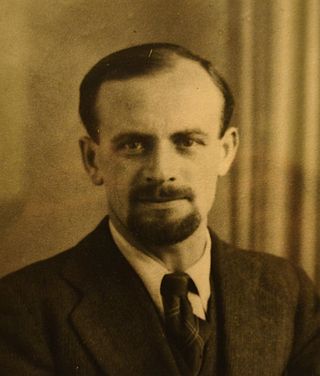
Carlo Martini (1908–1958) was an Italian painter and academician.

Self-Portrait in a Group of Friends is an 1824 or 1827 oil-on-canvas painting by the Italian artist Francesco Hayez, now in the Museo Poldi Pezzoli in Milan. The other people in the painting have been identified as : the painters Giovanni Migliara, Pelagio Palagi, and Giuseppe Molteni, and the scholar Tommaso Grossi.
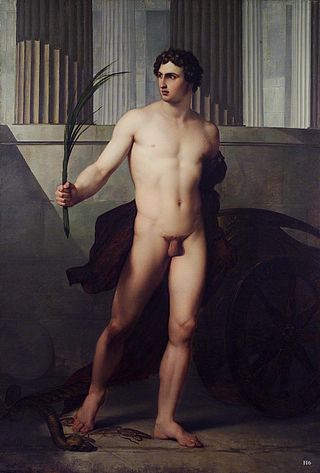
The Victorious Athlete or The Triumphant Athlete is an 1813 oil-on-canvas painting by the Italian artist Francesco Hayez, now in the Accademia di San Luca in Rome.

Self-Portrait Aged 71 is an 1862 oil-on-canvas painting by the Italian artist Francesco Hayez. The Uffizi had been requesting a self-portrait from him since 1858 via Andrea Appiani's daughter-in-law Giuseppina Appiani Strigelli and it finally arrived in 1863. It is still in the Uffizi's Vasari Corridor.

Lampugnani's Conspiracy is an 1826 oil-on-canvas painting by the Italian artist Francesco Hayez, now in the pinacoteca di Brera in Milan, which acquired it in 1907. It shows the conspiracy led by Giovanni Andrea Lampugnani, Girolamo Olgiati, Carlo Visconti and Cola Montano to overthrow the tyranny of Galeazzo Maria Sforza, killed on 26 December 1476 in Santo Stefano church in Milan.
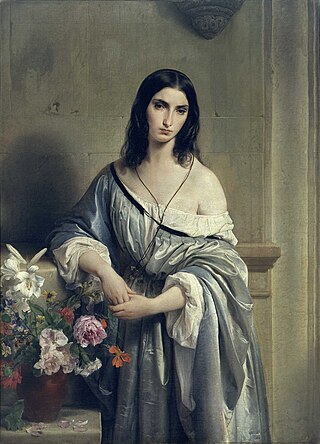
Melancholy is an oil-on-canvas painting executed during 1840–41 by the Italian artist Francesco Hayez, now in the pinacoteca di Brera in Milan.

Portrait of Alessandro Manzoni is an 1841 oil-on-canvas portrait of Alessandro Manzoni by the Italian painter Francesco Hayez, now in the Pinacoteca di Brera. It was commissioned in 1840 by Manzoni's second wife countess Teresa Borri Stampa and his son Stefano. After fifteen sittings the painter completed the work on 26 June 1841. Eight years later Teresa commissioned a portrait of herself by the same artist.
Gian Piero Brunetta is an Italian film critic, film historian, and academic.



















